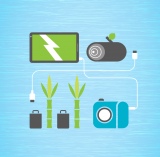Product pipeline: Sustainable lifestyles

As small changes in our behaviour can have a big impact on the environment, researchers are busy working to make our lifestyles more sustainable.
1. Plastic fantastic
Co-founded by Visiting Professor Vernon Gibson (Chemistry), spin-out company Plaxica is converting sugars, such as cereals and sugar cane, into the next generation of plastics. These new biopolymer-based materials have a lower environmental footprint, and comparable thermal and mechanical properties to oil-based plastics, such as nylon. They could have a large impact on the use of nylon in products like plastic bags, without compromising the performance that consumers expect.
2. Mini motors
Whilst hybrid vehicles are increasingly popular, they are still limited by the size of the batteries and motors required to run them. By developing engines and motors that are lighter and smaller without compromising on power, the co-founder of spin-out Evo Electric, Dr Michael Lamperth (MSc Mechanical Engineering 1996, PhD 1999) of the Department of Mechanical Engineering, has developed electric motors that are already in use in vehicles like the iconic London taxi cab.

3. Silicon saving
Award-winning start-up company Nexeon, founded by Professor Mino Green (Electrical and Electronic Engineering), has developed a new type of rechargeable battery with twice the energy capacity of those currently available. Nexeon uses new technology to stabilise silicon, so that it can be used as a viable alternative to carbon in the battery body, extending both the lifespan and performance of this essential everyday technology.
4. Fungal fuel
Biofuels are an attractive sustainable alternative to diesel and petrol but the crops that produce them take up land that could be used for food. Founder of spin-out company Mycologix, Life Sciences’ Professor Richard Murphy (PhD Pure and Applied Biology 1981), is using his 20 years of research to demonstrate how wood can be broken down by brown rot fungi, turning it into a low cost, efficient source of biofuel and reducing competition for agricultural land.
This article first appeared in Imperial Magazine, Issue 38. You can view and download a whole copy of the magazine, from www.imperial.ac.uk/imperialmagazine.
Article text (excluding photos or graphics) © Imperial College London.
Photos and graphics subject to third party copyright used with permission or © Imperial College London.
Reporter
Kathleen Weeks
Advancement